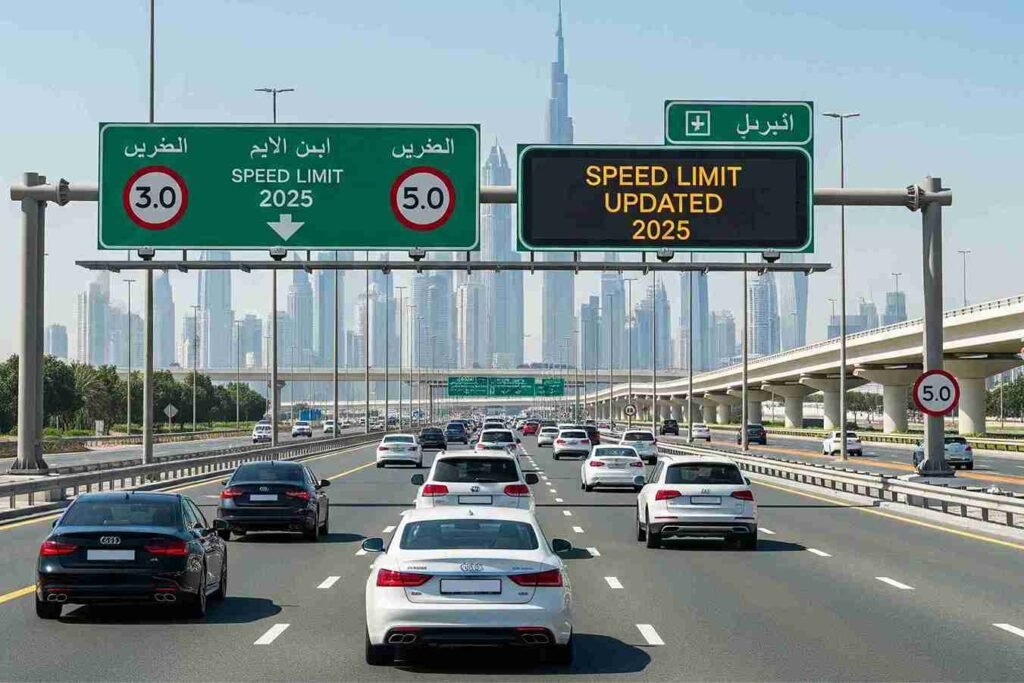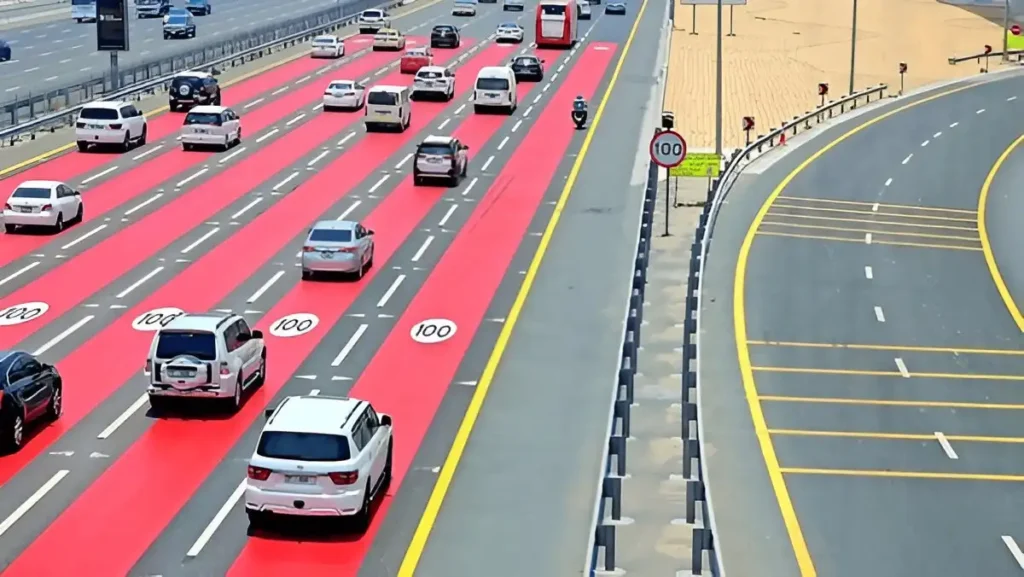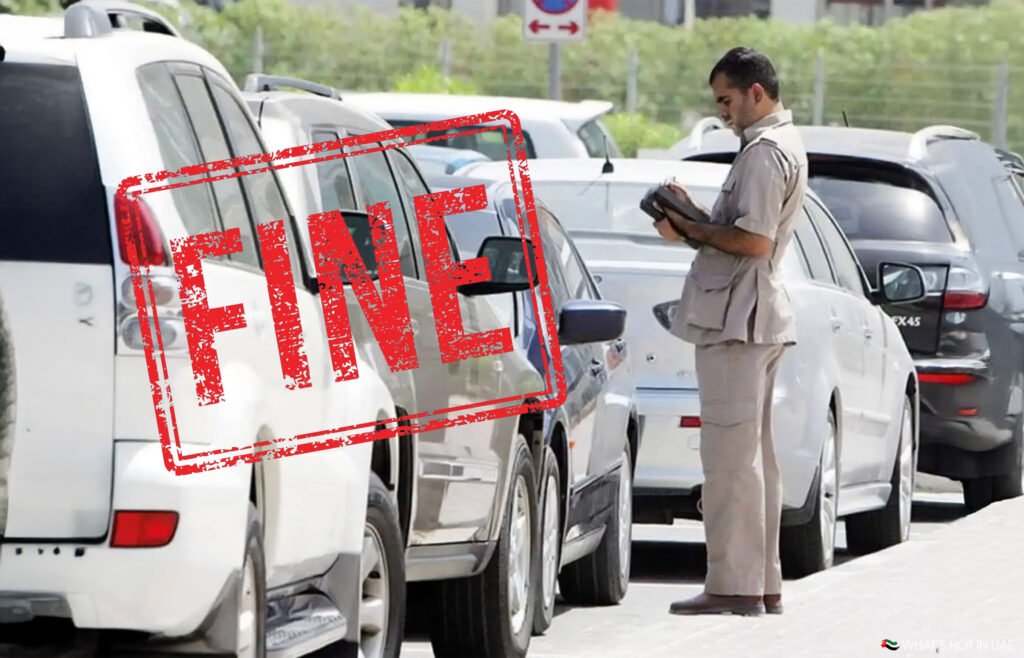The UAE traffic law has just been rewritten, and the message is clear: reckless driving now carries consequences far beyond fines. The new Federal Traffic Law introduces licence suspensions of up to three years, jail terms, and minimum fines of Dh10,000 for serious traffic offences. It’s a bold step in the country’s ongoing drive to make UAE roads among the safest in the world.
A Zero-Tolerance Approach to Dangerous Driving
The updated UAE traffic law is designed to target high-risk motorists who treat roads like racetracks. Those who drive under the influence, endanger lives, or operate vehicles while suspended will now face much harsher punishment.
At its core, the law seeks to create accountability and instil a sense of responsibility among all drivers. It’s part of a national effort to reduce road fatalities and promote a culture of respect behind the wheel.
For a complete practical guide to life in the Emirates, explore our full Living in the UAE hub.
Licence Suspensions Now Reach Three Years
The centrepiece of the new framework is the three-year licence suspension policy. Courts across the Emirates can now impose:
- Suspension of a valid driving licence for up to three years.
- Denial of renewal rights for two years following suspension.
- Disqualification of unlicensed individuals from applying for a new licence for up to three years.
During the suspension period, the licence is entirely invalid — not merely paused. Any attempt to renew, replace, or apply for a new one during that time will result in an automatic voiding of the document.

Driving While Suspended: Jail and Dh10,000 Fine
The toughest clause is aimed at drivers who defy suspension orders. Anyone caught operating a vehicle while their licence is suspended faces a minimum Dh10,000 fine, up to three months in jail, or both.
The rule applies equally whether the suspension was issued by a court, licensing authority, or traffic department. The UAE government intends this to serve as a deterrent against habitual offenders who have previously treated fines as a cost of convenience.
Arrests for Major Traffic Crimes
The updated law empowers traffic officers to arrest drivers involved in severe offences immediately. Arrestable acts now include:
- Causing death or injury through reckless driving.
- Driving under the influence of alcohol or narcotics.
- Major property damage due to negligent driving.
- Refusal to produce identification or driving documents.
- Attempting to flee an accident scene or evade police commands.
This shift from issuing citations to direct arrest represents a turning point in UAE traffic enforcement. It signals that road violations can now carry criminal weight, not just administrative fines.
How Appeals Work Under the New Rules
Motorists banned from driving can apply for a review — but only after six months have passed since conviction. The same court that imposed the disqualification has the discretion to lift or maintain it.
This clause balances firmness with fairness, allowing responsible drivers a chance to rehabilitate while keeping repeat offenders off the road.

Common Offences That Trigger Penalties
The law specifically targets patterns of behaviour that endanger lives. The most common violations include:
- Excessive speeding and street racing.
- Tailgating or aggressive overtaking.
- Distracted driving, including phone use.
- Driving under the influence of alcohol or drugs.
- Fleeing accidents or refusing to cooperate with police.
The enforcement priority is prevention — stopping accidents before they happen through fear of real consequences.
UAE-Wide Implementation
Unlike local municipal bylaws, the new Federal Traffic Law applies to all seven Emirates, ensuring uniform enforcement. That means the same penalties apply in Dubai, Abu Dhabi, Sharjah, Ajman, Fujairah, Ras Al Khaimah, and Umm Al Quwain.
A centralised digital enforcement system now enables traffic departments across the Emirates to share offender data instantly. This means repeat offenders can no longer escape penalties by switching jurisdictions.
Why the Law Matters
The UAE ranks among the most ambitious countries when it comes to public safety reforms. Over the past decade, accident-related deaths have dropped significantly thanks to camera systems, speed radars, and public awareness campaigns.
Yet, serious accidents caused by reckless behaviour remain a challenge. The new law aims to close those gaps, making every driver legally accountable and every violation traceable.
Everyday Scenarios Under the New Law
- Case 1: Driving After Drinking
A driver caught operating a vehicle under the influence now faces immediate arrest, court proceedings, and potential imprisonment — no more lenient fines. - Case 2: Driving During Suspension
Even if your suspension is nearing its end, one day of premature driving can result in a new criminal charge, Dh10,000 fine, and additional ban. - Case 3: Refusing to Stop
Ignoring a police order to pull over can now result in arrest on the spot, with charges of obstruction or endangerment added to your record.

Protecting the Public
The essence of the law isn’t punishment — it’s protection. The government’s long-term goal is to achieve zero road fatalities through deterrence, technology, and education.
The framework sits under the broader UAE Vision 2031 plan, where road safety aligns with sustainability and digital transformation. The government’s message is simple: drive responsibly, or lose your privilege to drive at all.
Quick Reference: Key Penalties
| Offence | Maximum Suspension / Fine | Possible Jail Term |
|---|---|---|
| Reckless / Dangerous Driving | 3 years suspension | Up to 3 months |
| Driving While Suspended | Dh10,000 fine minimum | Up to 3 months |
| Driving Under the Influence | Court discretion | Varies by severity |
| Fleeing Accident Scene | Immediate arrest | Yes |
| Refusing to Show ID | Fine + possible detention | Yes |
How to Avoid Trouble
- Keep your licence and ID handy. Officers have the right to request them anytime.
- Stay updated on your traffic record through the Ministry of Interior or Dubai Police app.
- Don’t risk it. If your licence is suspended, wait until the full period ends.
- Use public transport or taxis instead of driving after drinking.
- Follow speed limits and lane rules; small infractions often escalate.
The Bottom Line
The new UAE traffic law changes how the nation views driving — from a convenience to a privilege that can be lost. With harsher penalties, longer suspensions, and mandatory accountability, the country is signalling a new era for road discipline.
Drivers are no longer just responsible for their own safety but for every life sharing the road.
Frequently Asked Questions
Drivers face up to three years’ suspension, Dh10,000 fine, and three months in jail for serious violations.
No. Driving during a suspension is illegal and treated as a new criminal offence.
Yes. The law is federal and covers all seven Emirates.
You can petition the same court that imposed the suspension six months after conviction.
Reckless driving, DUI, causing death or injury, fleeing accidents, and refusing ID can all lead to arrest.



